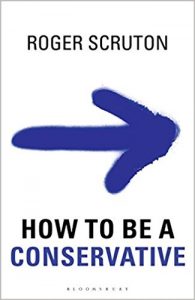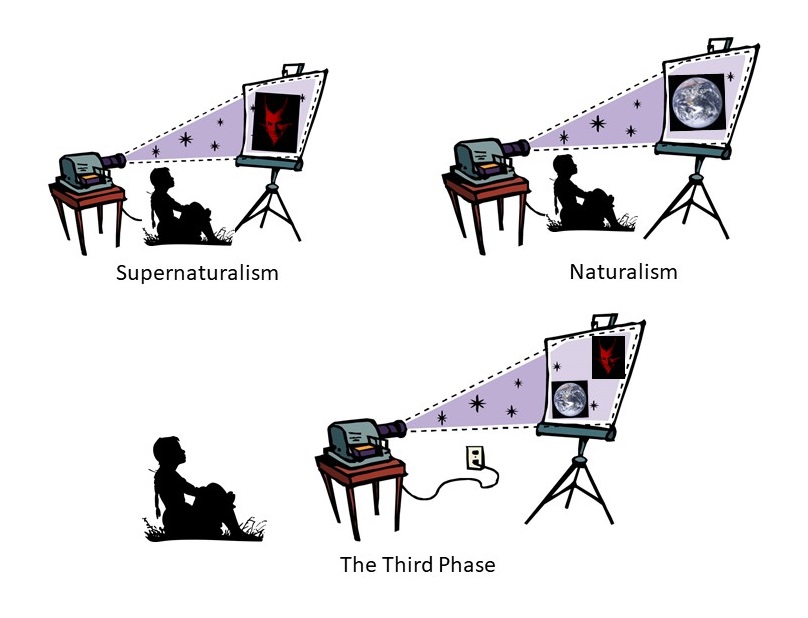A little while ago I purchased a book from a bookshop called ‘How to be a Conservative’ by Roger Scruton. I realised as I was buying it that I was feeling some embarrassment. It was a bit like buying a pornographic magazine. What if somebody saw me? What if someone thought I was a Conservative too?
Conservatives may put down this embarrassment to mere social conditioning. It’s true that my parents were liberal (which means middle of the road in England), and the majority of my friends have always tended more to the left than the right. But I don’t think that’s the only reason for my instinctive sense that being thought a Conservative would be shameful. As political polarisation advances, those on the left increasingly seem to see Conservatism, not as a coherent alternative political philosophy, but as a mask for the most unreflective exploitation. In the UK and the US at least, Conservatives are often seen as the epitome of narrow self interest. They are the allies of the big business and media interests who have brought about increasing social inequality, the stagnation of ordinary people’s standards of living, the starving of public services and the welfare state, and the galloping excesses of the rich as they plunder the world’s resources and exploit the ignorance of the poor. I think I can be excused for being concerned about any possible mistaken association that I support all that.
When I read Scruton’s book, however, I found, predictably, quite a different story. A fair section of that story I found quite coherent and in many ways in harmony with the Middle Way. Scruton is a thoughtful philosopher, but I did find him very uneven, sometimes slipping into the political prejudices of the Daily Mail (on issues like immigration and the EU) in a way that seemed to have no clear relationship to his overall case. The Middle Way Conservative case owes a lot to late 18th Century thinker Edmund Burke, and was discussed in Barry’s podcast with Amod Lele as ‘literal conservatism’. It recognises that human society depends on a complex inter-related web of relationships, institutions, cultures and values that has developed organically, not by planning. Revolutions threaten to destroy that rooted organic structure and all that is good in it. Over-reliance on the bureaucratic state can also destroy the deeply-rooted motivations and relationships of civil society, which are quite independent of the state. Scruton also stresses the ways in which our feelings of ‘home’ and of beauty and sanctity are rooted ones that depend on all these organic cultural relationships.
There are some important ways in which thinkers who have influenced me in recent years would agree with Scruton. Iain McGilchrist is a conservative who would stress the ways that the over-dominant left hemisphere can result in political dependence on an instrumental bureaucratic mindset. A more balanced relationship between the hemispheres is likely to result in more openness to the unplanned and unrationalised messiness of traditional civil society and religion. The work of Jonathan Haidt also points out the way in which Conservatives typically draw on a wider range of values than do liberals and socialists: not only care, justice and liberty, but also loyalty, sanctity and authority. Liberals and socialists do have a sense of loyalty, authority and sanctity of their own (think of the authority of past Labour greats, like Nye Bevan the founder of the NHS, for UK Socialists), but they often have trouble acknowledging that these values have much of a place in politics. Nassim Nicholas Taleb talks about the importance of ‘skin in the game’. It’s too easy to have an abstracted position on the reform of society and the things the government ought to do, but it’s what we actually have a stake in that’s morally important.
Scruton’s presentation of conservative values involves a basic appeal to balance. Most of his book takes the form of a discussion of ‘the truth of…’ a range of positions: nationalism, socialism, capitalism, liberalism, multiculturalism, environmentalism, internationalism, and conservatism. This effectively requires him to go through a sorting process in each case that involves thinking about what elements of each position are really compatible with a rooted, organic approach to civil society. For example, when he discusses ‘the truth in capitalism’ he points out the ways in which the free market offers a much more efficient way of determining the fair value of something in trade than any other. However, he also points out that the functioning of a free market depends on there being a stable society with certain basic moral norms, creating trust, on which that market depends. Scruton argues quite convincingly that some things don’t have a price and should not be sold, because to do so would corrupt the more basic structure of civil society on which the market relies. He also criticises the appeal to the free market of those who are passing on their costs to future generations by leaving a negative mark on the environment that will affect them.
There seems to be a basic compatibility between Burkean conservatism and the Middle Way. It is sceptical in a very embodied way, recognising our situated place in time and space. It also puts a lot of emphasis on incrementality – incremental, organic change is the only realistic and sustainable sort of change for humans. There is something highly integrative, too, in the conservative emphasis on the relationship between past, present and future. We delude ourselves if we think we can uproot ourselves from the past, and we bear a great responsibility to future generations. So why, in the end, do I also end up disagreeing with Scruton profoundly in many places? Why, too, does the idea of voting Conservative still seem as unthinkable as it has been all my life?
The main reason is that Conservatives are nowhere near conservative enough. Their appeal to a range of human values, where it happens at all, is far too selective and unreflective, and does often seem motivated by the interests of an economic elite under a very flimsy cover of conservative philosophy: as we have seen recently in the US, for example, in the flagrant voting through of tax cuts for the rich.
Objections to the ‘bureaucratic’ state are also deeply inconsistent, when Conservatives seem to have imposed far more bureaucracy on public services than any others, motivated by an overriding imperative to ensure value for money for taxpayers. Far from enabling genuine integrative growth in the realms of education and health, Conservative rule has imposed a crippling burden of bureaucratic distrust and disabling resource cuts on the professionals who work in these sectors. Far from enabling an organic balance of values to emerge, Conservatives tend to place a relentless emphasis on loyalty to the nation-state (as opposed to other levels of organisation) and fairness in terms of market rates (as opposed to many other sorts of fairness). In their dogmatic distrust of state power, they have often allowed corporate power and corporate bureaucracy to override the interests of workers. Far from respecting the sanctity of the environment, many Conservatives actively deny the threat of climate change, and are active in handing over protected areas to business interests. The trusted authority of the professional, the sanctity of the environment, the fairness of equity between employers and employees, care of the vulnerable – these all seem highly neglected values amongst Conservatives today.
There seem to be many different possible reasons for the ways that Conservatives have betrayed conservatism, but there seem to be two particular Faustian pacts that stand out. The first Faustian pact was with neo-liberalism, and dates back to the 1980’s and the era of Thatcher and Reagan. At first this may have corrected some excesses of the ‘bureaucratic state’, but it went on to to absolutise the power of the market rather than holding it in balance with other values. We have seen how destructive this has been. The other, more recent Faustian pact has been with nationalism. There is no reason at all why our sense of rooted loyalty, of ‘home’, of organic identity should particularly take the form of national rather than local, regional, continental or world identity; but Scruton, along with many other Conservatives, seems to simply assume that it must. The result of this way of thinking in the UK is Brexit, where Conservative breadth has given way to nationalist populism, and the visionary project to integrate a continent is under threat.
Can there be another political ideology whose application to practical policy is so shot through with contradiction and hypocrisy? No, I am in some ways conservative, just as I am in some ways socialist or liberal or green. But the best expressions of conservative philosophy seem to clearly recommend voting for left-wing or Green parties that attempt to rectify the imbalance of the ‘Conservative’ rule we have experienced. You would have to put this conservative on a torture rack to get him to vote Conservative.






